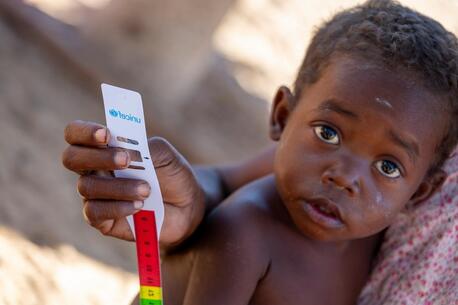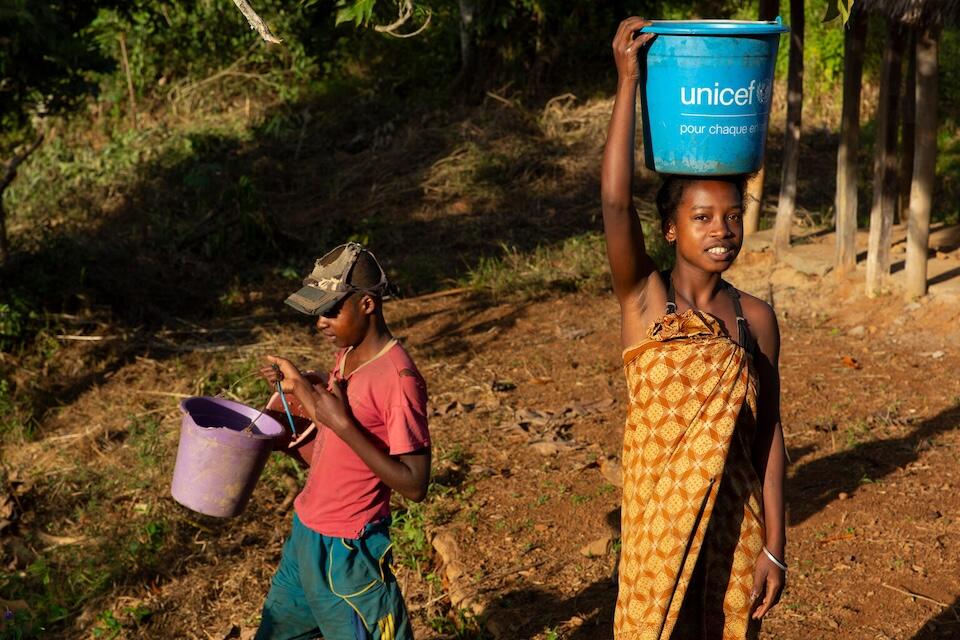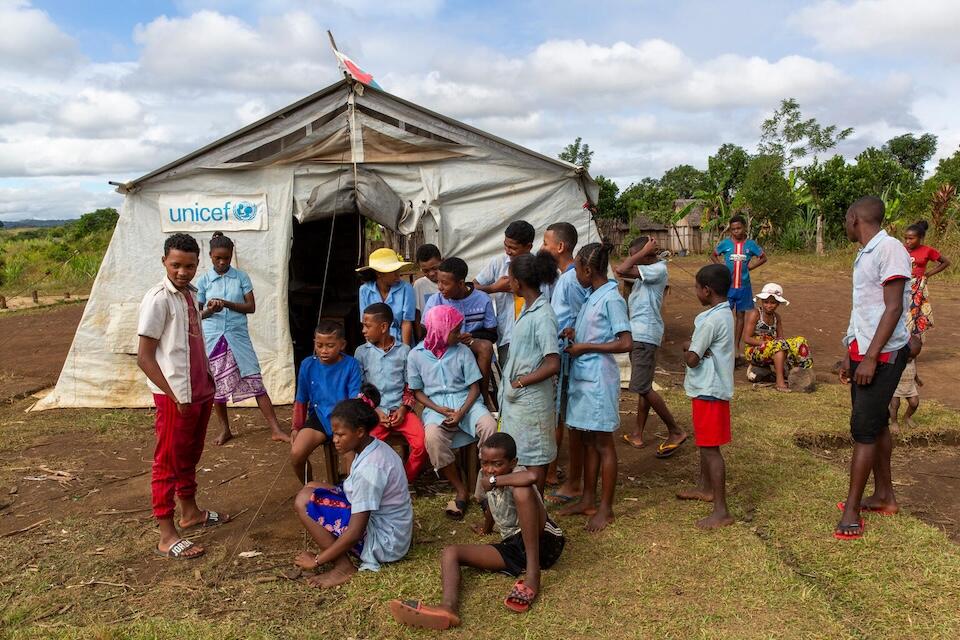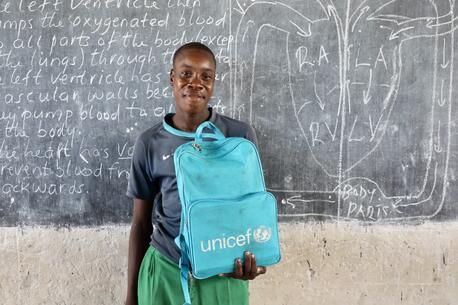
UNICEF Climate Action, Today and Tomorrow
As climate change continues to threaten children's rights, innovative approaches are needed to finance humanitarian relief, disaster risk reduction and sustainable recovery. UNICEF's groundbreaking Today & Tomorrow Initiative demonstrates a way forward.
An innovative finance solution to advance climate action
Climate change is a crisis affecting every single person on Earth, creating global emergencies and accelerating humanitarian needs across the board.
For some, the emergency is more dire than for others.
Nearly 1 billion children — or about half the world’s young population — live in countries where the effects of climate change are fueling extremely high risks to their health and safety. In these countries, children are repeatedly exposed to serious environmental hazards, shocks and stresses.
Extreme weather and other events fueled by climate change — tropical storms, hurricanes, cyclones, floods, droughts and wildfires — are multiplying in frequency and ferocity, endangering lives and communities. They are creating or worsening food insecurity, threatening the water supply, interrupting education and forcing more children and families to migrate.
UNICEF’s response to the climate crisis centers around the need to protect, prepare and prioritize children to secure a safe and sustainable future for all. The Today & Tomorrow Initiative (TTI) — an innovative financing partnership that prioritizes early action, preparedness, risk reduction and long-term sustainable recovery — is an important part of that work.
The goal of TTI is to increase financing for climate resilience building, emergency preparedness, disaster response and risk reduction work starting in eight cyclone-prone countries: Bangladesh, Comoros, Haiti, Fiji, Madagascar, Mozambique, Solomon Islands and Vanuatu.
The world’s first integrated climate and disaster risk finance mechanism designed with children in mind, TTI shifts the investment mindset away from the traditional disaster response to a more proactive risk management and prevention approach, Kitty van der Heijden, UNICEF Deputy Executive Director of Partnerships explains: "TTI breaks the cycle of disaster-response-repeat by combining investments in risk reduction and resilience building today, with an innovative finance model that provides protection for children and communities tomorrow."
In 2023 TTI generated $4.5 million in insurance payouts triggered by cyclones in seven of the eight designated countries. Going forward, UNICEF and partners are looking to build on that initial success, scale the approach to more countries and utilize similar risk financing tools to cover other hazards, such as earthquakes, floods and drought.
Today & Tomorrow impact case study: flexibility in funding a 'game changer' for cyclone-ravaged Madagascar
A case study of TTI's impact in Madagascar — a country that suffered more than 50 tropical storms and cyclones between 2000 and 2024, and where roughly 80 percent of children live in poverty — reports that the resources mobilized effectively reduced child exposure and vulnerability to future shocks and hazards, engaged children and young people in solutions and strengthened the essential social systems and services they rely on most.

“For us, climate change is not a threat; it is not something that we are talking about as if it was coming, something dangerous," says Max Fontaine, Madagascar's Minister of Environment and Sustainable Development and a former UNICEF youth climate advocate. "We already live it in our daily lives and we live it every year."
The overall response to cyclones in Madagascar has typically involved allocating funds to specific sectors for about six months. Applying the TTI approach, however, meant introducing a more flexible funding model to address multi-hazard risks, focusing on strengthening preparedness of children, communities and infrastructure before the next tropical cyclone hits; accelerating a quicker response when a storm occurs; and building back better, by ensuring that disaster recovery, rehabilitation and reconstruction efforts enhance resilience.
From a financial standpoint, this strategy has improved the return on investment compared to a typical disaster response —saving an average of $15 for every $1 invested in risk reduction and prevention.
The strategy has improved the return on investment compared to a typical disaster response — saving an average of $15 for every $1 invested in risk reduction and prevention.
Specifically, the support enabled UNICEF Madagascar and partners to:
- enhance climate and multi-hazard resilience in schools and across the education service sector
- engage youth in green entrepreneurship, offering young people opportunities to contribute to climate solutions
- provide a surveillance and management system for childhood illnesses that are sensitive to and aggravated by climate change
- implement community disaster risk reduction measures involving children, young people and teachers, including establishing child-focused early warning systems and school-based disaster preparedness
- strengthen the capacity of the national social protection system to adapt to climate change, with the aim of including climate vulnerability indicators in the social registry
The 'Tomorrow' component offers parametric insurance coverage, which provides UNICEF Madagascar with cyclone disaster response funding based on wind speed and child population. These payouts complement regular humanitarian aid and enable faster response times, and are typically released within 72 hours of a triggering cyclone event.
The quick turnaround time allows UNICEF and its partners to act fast, helping to prevent or mitigate additional negative impacts such as disease outbreaks or malnutrition.
Since 2023, funding secured through the new mechanism supported a range of cyclone and storm response and recovery efforts, including post-disaster assessments and data collection; the provision of emergency health, nutrition, sanitation and hygiene supplies; strengthening community-based mental health and psychosocial support and rehabilitating or rebuilding damaged schools.

In short: TTI came through on its promise, enabling the government of Madagascar and other partners to pivot away from a reactive emergency response in favor of a more holistic and proactive approach.
“The flexibility of the funding has proven [to be TTI's] most valuable attribute," UNICEF Madagascar Climate, Environment, Energy and Disaster Risk Reduction (CEED) Specialist Anneleen Van Uffelen says. "We can direct funds towards the interventions and regions with the most significant gaps ... Cyclones can take different pathways that pre-allocated or sector-specific funding cannot reach. Flexibility in how we fund our response and sustainable recovery is a game changer."
Learn more: visit the UNICEF Climate, Environment, Energy and Disaster Risk Reduction team's report page.
Help UNICEF scale its climate work to protect children's futures. Please donate.
